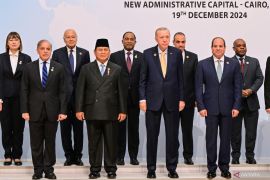Particularly important will be how the currently-frozen "peace process" will be affected by the Egyptian uprising, commented a UAE daily.
"There`s been a lot of hype, mainly from the Israeli camp, that the latest developments in Egypt will turn it hostile towards Israel. The logic is; Egypt, one of only two Arab countries to have signed a peace treaty with Israel, is "stable" under Egyptian President Hosni Mubarak. But changes to the current system could bring in leaders who will reconsider that peace agreement. Israeli Prime Minister Benjamin Netanyahu himself warned that "in a situation of chaos, an organised Islamist body can seize control of a country" citing Iran as an example", said Gulf News in its today`s editorial.
Before Egypt erupted and even before Tunisia`s Jasmine Revolution, negotiations between the Palestinians and Israelis were falling apart. Under America`s watch, Israel refused to comply with international law and freeze its illegal colony construction and expansion activities despite it being a basic condition for talks to resume. Other pending issues include the ongoing Israeli occupation of East Jerusalem and the West Bank, the illegal separation wall which resulted in the carving of more Palestinian land, the right of return, Gaza`s lock down and the 30,000 Palestinians illegally imprisoned by Israel, it added.
"The peace process will remain in place if there is a genuine commitment from the Israeli side. The conditions for peace have remained the same for the past four decades. Since 1967, the Arab position has been to end the illegal occupation of Palestinian land and the 2002 Arab Initiative clearly stated that peace is an Arab strategic choice. Israel`s current paranoia over Egypt`s change of government is an excuse to distract from the basic requirements for peace, which Tel Aviv has failed to adhere to", the paper concluded. (*)
Editor: Kunto Wibisono
Copyright © ANTARA 2011











